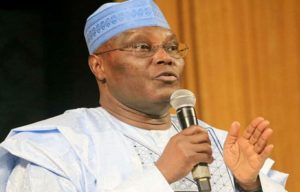
Lagos, Nigeria, February 14, 2019//-The recent rally in Nigerian assets may pick up steam if there’s a change in government after this weekend’s presidential election, according to money managers and banks including Alliance Bernstein LP and Citigroup Inc., reports Bloomberg.
The main equity index in Nigeria is heading for its best month in more than a year. But its 3.1 percent gain in 2019 is still less than half the 7.9 percent jump for MSCI’s gauge of emerging-market stocks.
Foreign investors haven’t warmed to Nigeria despite rising prices for oil, its main export, and the U.S. Federal Reserve’s dovish tilt, which has fueled demand for riskier assets.
That’s mainly due to nervousness around the tight February 16 vote, which will pit President Muhammadu Buhari, presidential candidate of the All Progressives Congress (APC) against Atiku Abubakar, the presidential candidate of the Peoples Democratic Party (PDPD), who has pledged to float the currency and privatise state companies.
“If the elections pass smoothly, we should see a rally regardless of who wins,” said Ayodele Salami, who manages about $400 million of African stocks as chief investment officer of London-based Duet Asset Management Ltd.
“But an Atiku victory could mean even more of a leg up to the relief rally. That would be on the expectation that there will be a reform agenda. His campaign has been very much focused on pro-market policies.”
Analysts are undecided about the outcome. New York-based Eurasia Group predicts Buhari will be re-elected, while Teneo Intelligence, in the same city, forecasts a win for Atiku.
The head of the Nigerian Stock Exchange, Oscar Onyema, said last month he expected a post-election pickup as politicians turned their attention back to reviving an economy that’s recovering slowly from a contraction in 2016.
Still, it’s easy to see why some investors would want a change from Buhari. Since the 76-year-old, who ruled Nigeria briefly in the 1980s as a dictator, came back to office in May 2015, the nation’s stocks have been the world’s worst performers in dollar terms, losing almost half their value.
Fixed-income traders have also had it tough. In September 2015, JPMorgan Chase & Co. kicked Nigeria out of its indexes for emerging-market local-currency bonds, essentially for maintaining a peg that left the naira overvalued and led to shortages of foreign exchange.
While the currency has since been allowed to weaken, the central bank still manages its value closely via a system of multiple exchange rates. That’s meant the Abuja-based regulator has had to keep bond rates attractive to entice back foreign investors. Yields on naira bonds average 14.8 percent, the fourth-highest among major emerging markets.
“We suspect the market would cheer an Abubakar victory simply because it would shake up the uninspiring status quo,” Adriaan du Toit, a London-based economist at AllianceBernstein, which manages $550 billion of assets, said in a note to clients. “Abubakar has implied that he would support a more flexible exchange rate for the naira, a precondition for the country to be added back into global bond indexes.”
Buhari pledged to boost economic growth this year to 3 percent from 1.9 percent in 2018 by increasing spending on rail and power projects. Abubakar, 72, has promised to loosen the state’s grip on the economy, including by selling part of Nigerian National Petroleum Corporation (NNPC), which dominates the local oil and gas industry, and removing a cap that keeps the country’s gasoline prices among the lowest in the world.
“An Atiku victory will trigger a rally because a lot of people expect that he is going to push through his promises,” said Kunle Ezun, an analyst at Ecobank in Lagos. “A Buhari win will just mean a steady market.”
Not everyone is convinced that an “Abubakar bounce” would last. Plenty of politicians have failed with bold reform plans in the past, and oil prices are still barely half what they were five years ago.
“There might be that initial positive reaction, but I think it will be short-lived,” said Kayode Omosebi, an analyst in Lagos at Asset & Resource Management Co. “No matter what you want to do, the oil price is still a big concern for us as a country.”
independent.ng


